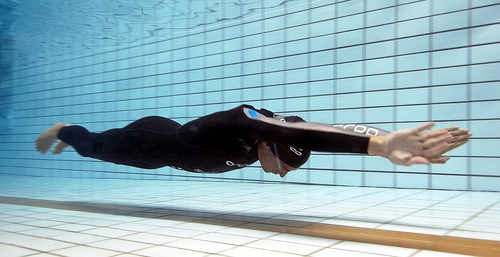Inhale, Exhale: How To Improve Your Breathing While Swimming
Posted by Goggles n More on 28th Jul 2014
Shop Prescription Swim Goggles

Breathing is an element of swimming that's often overlooked by newcomers to the sport. When you're busy working on proper form, reducing resistance, and improving your technique, you might overlook the importance of conditioning your lungs to breathe correctly. Whether you swim competitively or simply for recreational purposes, though, you should spend some time practicing and toning your breathing technique.
Keep Your Body Relaxed
Maintaining a relaxed state throughout the duration of your swim will allow you to breathe more naturally and comfortably. Don't tense your body, but instead keep it loose and relaxed. This includes your body, head and neck. Swimmers who maintain a tense body usually hold their breath underwater, which results in poor air exchange and subsequently greater fatigue/exhaustion. Let your body relax so you aren't tense and constricted.
Exhale Slowly
Do you hold your breath each time you go underwater during a stroke? This is a bad habit that swimmers should break. Most coaches recommend swimmers keep their lips just slightly open to exhale while they are underwater. Open your lips just enough to exhale at a slow, steady pace underwater, at which point you can expunge any remaining air from your lungs upon surfacing.
By exhaling gradually, you'll maintain your speed and endurance while reducing the risk of hyperventilating. It may take some practice but try exhaling each time your head dips below the surface.
Know When To Inhale
In the freestyle, breaststroke and butterfly strokes, swimmers should inhale immediately before going underwater. When you initially break through the surface, you should exhale to remove any remaining air from your lungs. As your body begins to go back down towards the surface, take a deep breath and close your lips right before your head goes underwater.
Time Your Breathing
Timing is critical when it comes to breathing while swimming. If you breathe too early or too late, your entire momentum could be thrown off, allowing your competitors to pass you. There's a certain “rhythm” that swimmers develop, however, which allows them to control their breathing on autopilot.
If you're having trouble developing your breathing rhythm, start slow and practice in a pool by yourself. It's easier to learn the concept of when to inhale and when to exhale without the stress of other swimmers next to you. With practice, persistence and dedication, you'll eventually find a rhythm that allows you to breathe naturally as you swim through the water.




